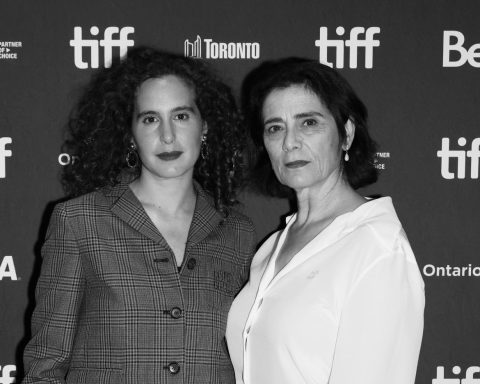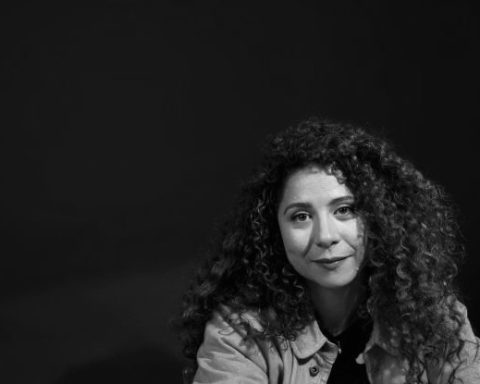Legendary cinematographer Ellen Kuras has come full-circle with her immaculate directorial debut, Lee, that recounts a period of ten years in the life British Vogue’s World War II correspondent Lee Miller under the magazine’s imposing editor-in-chief Audrey Withers, and that world premiered at the Toronto International Film Festival.
Not a biopic and based on the book The Lives of Lee Miller written by Anthony Penrose, Miller’s son with her second husband, historian and champion of the Surrealist movement Roland Penrose, it explores the most significant decade of Lee Miller’s life – the period between 1938 and 1948. As a middle-aged woman, Miller refused to be remembered as a model and male artists’ muse, so she defied the expectations and rules of the time and traveled to Europe to report, as a photojournalist, from the WWII front lines, taking it upon her to expose the atrocities committed by Nazi Germany and thus gifting us with some of the 20th century’s most indescribable images. Indeed, what she captured on her Rolleiflex camera in Dachau and all over Europe was soul-shattering and her photographs remain among the most historically relevant. Miller single-handedly changed war photography forever, but the personal and emotional cost of what she witnessed and what she fought to tell was very high. It is perhaps because of her own extremely well-hidden trauma that she gave a voice to the voiceless through her lens.
After working together on Michel Gondry’s Eternal Sunshine of the Spotless Mind for which she served as cinematographer, Ellen Kuras reteamed with Kate Winslet on Lee. Kuras’ direction of Winslet is gentle yet precise and yields one of the actress’s best performances to date. The film has a tense, bewitching pace, with Kuras paying tremendous attention to detail throughout. It is therefore perhaps not surprising that it is visually spectacular – the light and airiness of the initial scenes are slowly but surely substituted by a suffocating and brutally somber color palette of khaki green, grey and occasional beige, enhanced by Pawel Edelman’s crisp and unobtrusive lensing and Gemma Jackson and Michael O’Connor’s lush yet sober production and costume designs respectively, allowing the audience to be immersed not only in the physical space of war, but also – and even more so – the emotional one, and it is difficult to remain indifferent.
While many aspects of Miller’s life are depicted here, it is her friendship with fellow photographer David E. Scherman that is the most satisfying to watch and one that adds emotional density to the story. Framing the film around an interview with a young man, who, at the end of the film, is revealed to be someone very close to Miller is conventional, especially if you know Miller’s story and life, but it is effective nonetheless as it sneakily succeeds in eliciting a few tears. Moreover, sometimes, we do not see what Miller sees or does when she enters certain spaces in Dachau or elsewhere in Germany, but we do see the photograph she ends up taking then in the (mysterious) interviewer’s hand – it is a pile of cadavers. Kuras molds this – and other similar moments – in a manner that effortlessly takes us through Miller’s unparalleled experience and unique eye and perspective with a persuasive avoidance of dramatic exaggeration, which is also true of the war scenes that speak clamorously on their own. All this is amplified by Alexandre Desplat’s subtle yet penetrating score. The male roles are somewhat underdeveloped, but as the film does not revolve around them – and rightfully so – that does not matter at all because this film has a decisively and purposefully female gaze and I am all for it!
Going back to Winslet’s performance, not only is it precise, extremely nuanced, but it deeply draws us in, letting us see the toll that her war experience takes. The film also features brilliant supporting turns from Andrea Riseborough as Audrey Withers, Marion Cotillard as Solange D’Ayen, the fashion director of French Vogue and another close friend of Miller’s, Vincent Colombe as French poet Paul Éluard and Noémie Merlant as his wife Nusch Éluard, Alexander Skarsgård as Roland Penrose, Josh O’Connor as Anthony Penrose and Andy Samberg as fellow war photographer David E. Sherman.
Lee is a poignant, splendid and carefully crafted film about a fearless woman who possessed extraordinary talent and fierce determination and lived her life at full throttle. It is a film that is a vibrant reminder of the intrepid women who fought daringly to enter male-dominated places and made enormous sacrifices, eventually indelibly altering the way we perceive the world.
Production: 55 Films, Brouhaha Entertainment, Hantz Motion Pictures, Hopscotch Features, Juggle Productions, (US/UK 2023). Producers: Finola Dwyer, Lauren Hantz, Troy Lum, Andrew Mason, Erika Milutin, Marie Savare, Kate Solomon, Kate Winslet. Executive Producers: John Collee, Laura Grange, Liz Hannah, John Hantz, Billy Mulligan, Thorsten Schumacher, Julia Stuart, Crystine Zhang. Co-producers: Ildiko Kemeny, Darin McLeod. Line producer: Ferenc Szále. Director: Ellen Kuras. Screenplay: Liz Hannah, Marion Hume, John Collee, based on the book The Lives of Lee Miller by Anthony Penrose. Cinematography: Pawel Edelman. Costume Design: Michael O’Connor. Production Design: Gemma Jackson. Score: Alexandre Desplat. Editing: Mikkel E.G. Nielsen.
Cast: Kate Winslet (Lee Miller), Alexander Skarsgård (Roland Penrose), Josh O’Connor (Anthony Penrose), Andrea Riseborough (Audrey Withers), Marion Cotillard (Solange D’Ayen), Vincent Colombe (Paul Éluard), Noémie Merlant (Nusch Éluard), and Andy Samberg (David E. Sherman), James Murray (Colonel Spencer), Samuel Barnett (Cecil Beaton), Enriwue Arce (Pablo Picasso), Zita Hanrot (Ady Fidelin), Arinzé Kene (Major Jonesy), Sean Duggan (Man Ray), Patrick Mille (Jean D’Ayen), Harriet Leitch (Ann Douglas).
Color – 116 min. Premiere: 9-IX-2023 (Toronto International Film Festival)
Photo credits: Courtesy of TIFF.









